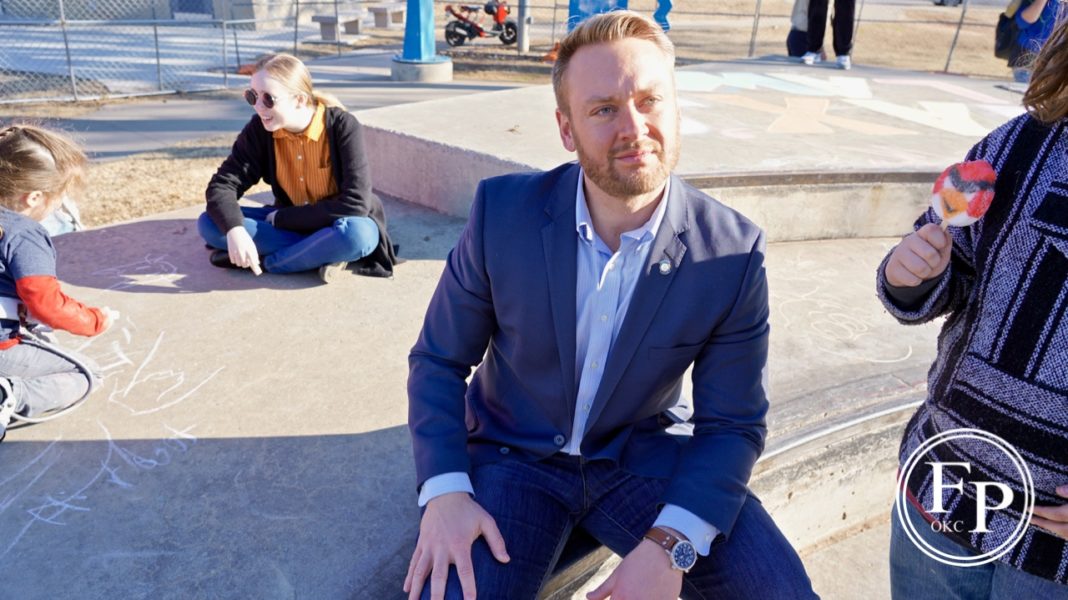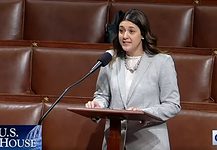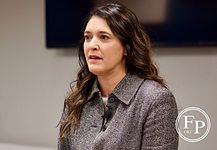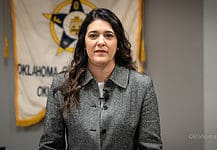South OKC House District 93 Representative Mickey Dollens (D) argues for a new public works program to benefit individuals and the public.
OPINION – OKLAHOMA CITY — As Oklahoma emerges from the pandemic and continues down the road to recovery, we face a set of interrelated social and economic challenges that predate the crisis and continue to affect the state even as the crisis abates.
Too many of our citizens remain left behind in precarious economic circumstances – as of 2019, 10.7% of Oklahomans lived in poverty, and labor force participation had fallen below 61%. Not only does this economic insecurity leave a human toll, but it also creates a fiscal burden for state and local authorities.
Income insecurity, predatory debt traps, eviction, homelessness, and recidivism are mutually reinforcing problems, and taxpayers ultimately pay to treat these symptoms. Rather than paying for these problems on the back end when the price is highest, Oklahoma should explore new solutions to manufacture public cost avoidance and help its citizens make ends meet through a community-driven public jobs initiative.
This is the purpose of Transitional Public Benefit Work: simultaneously save taxpayer dollars and confront these social problems.
Interrelated Problems
The case for a public benefit works program is strong and reflected across a range of economic indicators.
An estimated 36% of Oklahomans live on the border of household solvency. An income shock in the form of a lost job or unexpected expenses can push these families over the edge. This can quickly lead to eviction, often for less than $600 or a month’s rent.
After the eviction, costs can escalate rapidly, as the public shoulders the burden of emergency shelter and medical care. Job loss, mental health problems, and effects on children can quickly follow and compound the situation. With eviction rates of 7.8% and 6.2%, Tulsa and Oklahoma City have the 11th and 20th highest eviction rates in the country. Indeed, the statewide eviction rate is double the national average. This high rate of eviction creates significant public costs for the state.
In the worst case, an eviction can drag families and individuals into a cycle of homelessness, at a cost of between $30,000 and $50,000 per person, per year.
With nearly 4,000 people homeless on a given night in the state, a back-of-the-envelope estimate would place the annual cost of homelessness at $160 million. One way or another, we are paying for homelessness.
Similarly, we are shouldering the expenses of incarceration – in 2020, the Department of Corrections spent $613 million to sustain an imprisonment rate 78% above the national average. Recent criminal justice reforms have improved the situation somewhat, but the state still has significant room to achieve cost savings through the criminal justice system while maintaining public safety. Addressing the economic causes of recidivism through transitional public benefit work would help to contain these costs.
An Idea with Return on Public Investment
Eviction, recidivism, poverty, and homelessness are complex problems that resist simple solutions, but each results at least in part from income insecurity and unemployment. Enter Transitional Public Benefit Work.
Transitional public benefit work would allow Oklahomans to quickly access flexible work opportunities to maintain household solvency without turning to payday lending or social safety nets.
A flexible work opportunity could allow a family to maintain housing and avoid the personal and public costs of eviction and homelessness.
Similar logic applies to recidivism. The state pays an average of $21,280 for each individual incarcerated, and the 2020 Department budget included $884 million to house continued growth in the prison population. Given these costs, the state has an economic interest in reducing recidivism rates and reintegrating ex-offenders back into society.
Yet, studies repeatedly show that these individuals face substantial barriers to gaining permanent employment and that unemployment and poverty are the best predictors of reoffending. Combined with existing initiatives from organizations like the Community Service Council and the Oklahoma Partnership for Successful Reentry, transitional public benefit work could help returnees demonstrate credibility to employers, maintain housing, and transition back to full-time employment while delivering fiscal savings for the state.
Benefits to Communities
The potential benefits of this proposal extend beyond public cost avoidance.
A modern approach to transitional public benefit work under a flexible gig economy model would allow Oklahomans willing to work in their communities to reenter the labor force or supplement their earnings to regain financial stability without the rigid scheduling constraints of traditional, low-wage work models. Payments to income-insecure Oklahomans would keep tax and non-profit dollars in parts of the state that could most benefit from economic growth.
And perhaps most importantly, local community organizations and governments could deploy this labor to meet pressing local needs. Projects could range from neighborhood clean-up to work in food banks or tree planting. Investments in community gardens could help counter the presence of food deserts in both rural and urban parts of the state. Finally, the program would employ technology to monitor outputs and outcomes and provide transparency and accountability.
Addressing Questions and Objections
Naturally, some may have questions about the cost, implementation, and efficacy of such a program. An interim study can address many of these concerns by putting a pilot program into the field to identify best practices. But I can anticipate and address many potential objections now:
- Cost – Some may worry about the cost of a new social program. However, as we have argued, the state already pays for the costs of poverty, eviction, homelessness, and the like. By addressing the income insecurity roots of these problems proactively, we can reduce public costs and get a return on our investment.
- Bureaucracy – Additionally, skeptics of the policy might worry about an expansion in the size of government to manage the program. While state and local authorities can and should oversee the program to safeguard taxpayer dollars, the best model is likely one that relies on Oklahoma’s robust network of nonprofit organizations to oversee workers and projects while boosting their desired outcomes within their organization. This reduces costs to the public and minimizes the government’s administrative burden.
- Transparency and accountability – This naturally raises the question of accountability, and how to ensure taxpayer dollars are well spent and that the program benefits its intended recipients. First, the state can select and vet its non-profit partners to ensure it works with reputable organizations with proven track records. Additionally, technology can help allay transparency concerns. The use of mobile applications can ensure payments are digital, traceable, and taxable. The perhaps surprisingly high rate of cell phone ownership among people experiencing homelessness makes this feasible.
- Targeting – Some may ask how the system would ensure that it benefits only those in need. Fortunately, state and municipal governments have a range of options to ensure compliance. For starters, they could work with nonprofit case managers to screen participants, and they could place a limit on the number of hours participants could work. This would ensure that the program functioned as a bridge to full-time employment or as a temporary income supplement. A pilot program could experiment with best practices to shape outcomes for the implementing government.
- The COVID Recovery – Finally, skeptics may question the need for a transitional public benefit work program as the economy recovers and jobs become more readily available. Indeed, state unemployment has reached 4%. Yet even at the height of the macroeconomic expansion in 2019, when unemployment fell to 3%, labor force participation remained low and job prospects remained difficult for individuals experiencing homelessness and the formerly incarcerated, and economic conditions were uneven across the state. These individuals need the help of a transitional work program to reach permanent employment, and even those with stable work can benefit from flexible opportunities to make ends meet without turning to payday lending. Moreover, even in a strong economy, the state can still save money by helping its citizens avoid eviction and homelessness. Finally, it bears emphasizing that this program would be explicitly designed not to displace private sector employment, but to serve as a bridge to it.
“This Transitional Public Benefit Work Interim Study creates an ideal partnership between government and the nonprofit sector to work towards providing thousands of Oklahoma families with an alternative to financial desperation. Nonprofits serve many people who face barriers to employment and are left navigating inflexible, low-wage employment options. A financial stop-gap and proof of recent work history would empower them to change their circumstances.” – Marnie Taylor, President and CEO of Oklahoma Center for Nonprofits
Conclusion
The economic and human case for a transitional public benefit work program is clear. By connecting income-insecure Oklahomans with flexible work opportunities, we can address pressing social problems head-on and tackle the problems of eviction, homelessness, poverty, incarceration, to name just a few.
Moreover, my interim study on a Transitional Public Benefit Jobs Program can help determine the best options for program design and implementation and assess the role that nonprofits and the private sector could play in partnership with state and local governments.
Best Regards,
Representative Mickey Dollens
Oklahoma House District 93
Economic Policy Chair – House Democratic Caucus
Free Press from time to time invites or accepts opinions written by persons who are not in our organization but are known to us in the community or state. If you would like to write an opinion for us, please write to info (at) freepressokc.com.











